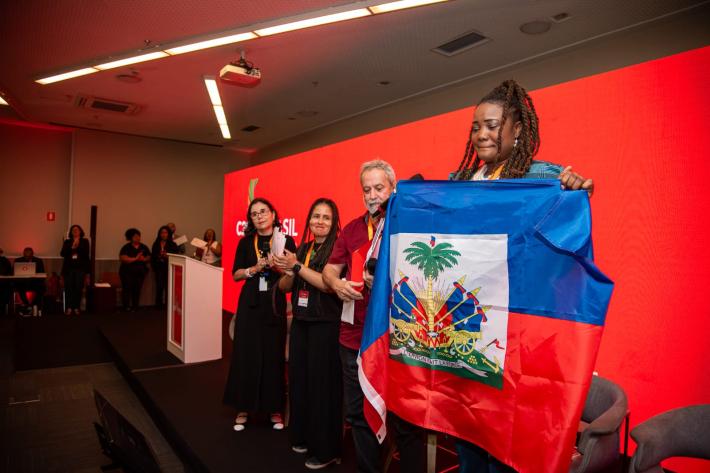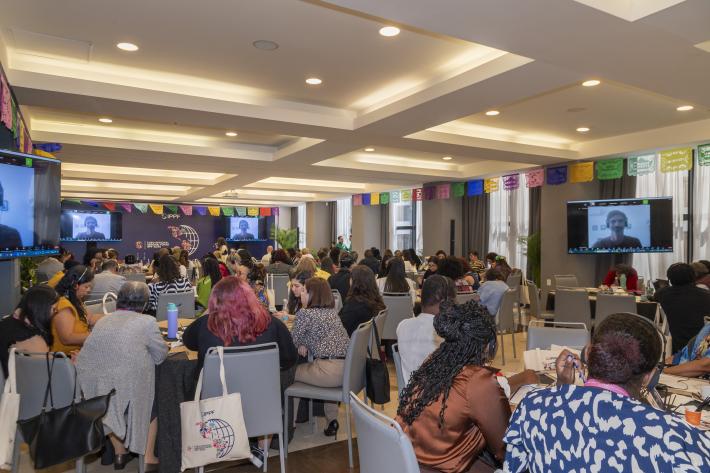Latest press releases
A selection of stories from across the Federation
Americas & the Caribbean
Breaking: IPPF Global Research Exposes Devastating Impact of the Trump Administration
Over Half of Partners and $85 Million Affected
For media enquiries

| 31 July 2024
Venezuela: Only in democracy are rights guaranteed.
Haz click aquí para leer este boletín en español. IPPF expresses our concern about the situation in Venezuela and our total solidarity with its people, who on 28 July received the news from the National Electoral Council (CNE) that the current president, Nicolás Maduro, was elected for a third presidential term. There are serious allegations of a lack of transparency in the process and we join the international community in demanding the publication of the election results, because, as of today, July 31st, the CNE has not shown the results of the election to prove the victory of Nicolás Maduro. It is worrying that the state security forces have responded with violence and repression since the beginning of the mobilisations, which continue, with hundreds of people arrested and a growing number of deaths. In addition to the current emergency, inequality, gender inequality and lack of access to health services, including sexual and reproductive health, have been on the rise for the past 25 years. It is impossible to forget: in Venezuela, the number of femicides has doubled in the last 6 years; 28.7% of people of sexual and gender diversity have been victims of violence by state security forces; 91.5% of complaints of violence against women are shelved or dismissed; legislation on abortion is extremely restrictive and services are very limited; in addition, 7.7 million people have been forced to move because of the socio-political context. With extreme concern, IPPF in the Americas and the Caribbean condemns the Venezuelan government's repression and violence against citizen mobilisations. It is unacceptable that while exercising their right to protest and free expression, Venezuelans are victims of criminalization and physical and political violence. IPPF ACRO joins the Venezuelan society in their demands for respect of democracy because the will of the people through authentic elections is a right and must be guaranteed by the State. ‘The situation in Venezuela further exacerbates the escalation of authoritarianism and violence in our region,’ said Alessandra Nilo, Director of External Relations at IPPF ACRO. ‘Democracy is conducive to states that guarantee and advance rights, including sexual and reproductive rights which, we know, in times of high tension and crisis, are the first to be violated. At this difficult time, we demand that the Venezuelan State returns to the democratic path, strengthens its institutions and respects the rights and wishes of its people. It is essential to protect the dignity and hope of all people, especially girls and women in all their diversity.’ ‘IPPF ACRO and Member and Partner Associations in the region are attentive to the development of events, we remain committed to Venezuelan people and their integral wellbeing, and we will continue to provide sexual and reproductive health care and services in Venezuela and, given the projected intensification of the migration wave, also in surrounding countries such as Colombia, Peru and Ecuador.’ Header image credit: REUTERS/Leonardo Fernandez Viloria

| 16 October 2023
IPPF ACRO express concern over guidance of the Zambian Ministry of Health who advised against the use of the term “sexual and reproductive health and rights”.
At a time of profound and multiple crises, it is worrying that the focus of any government's action is to go back on already consolidated international commitments, particularly those which recognize, based on evidence, that Sexual and reproductive health and rights (SRHR) are fundamental human rights, central to eradicating poverty and achieving sustainable development across its social, economic, and environmental dimensions. SRHR – which encompasses a range of issues, including universal access to SRH services and supplies, comprehensive sexuality education, and ending gender-based violence and harmful practices such as early, child and forced marriage – are fundamental to the ability of all people, especially women, adolescent girls and young people, to lead full, satisfying, healthy and productive lives. SRH services are a critical aspect of SRHR, but a complete understanding of sexual and reproductive health and rights goes far beyond on access to health facilities and services to include an array of social, legal, institutional, and financial arrangements that enable individuals to exercise their rights in general and addresses the underlying social determinants. In this regard, our Latin American community urges the government of Zambia to review its position and, on the contrary, to improve and expand the SRHR services, including increasing funding in this sector, for example by investing in fulfilling the human rights of women and girls, in all their diversity, as gender discrimination is one of the leading determinants of poor health and unwanted SRHR outcomes. It is also key to addressing inequities in access due to poverty and multiple forms of discrimination, stigma and social and economic exclusion affecting various population groups. We conclude by highlighting the importance of evidence-based policies and, in 2023, the data indicates that effective policies are not those based on stigma and discrimination or elimination of rights. On the contrary, effective policies are those that include, care for, and treat all people as subjects of rights, capable of making decisions about their health and reproductive life, with the support of a State committed to promoting citizenship and the human dignity of their people. Here, at IPPF ACRO, we will remain attentive and always willing to contribute so that rights do not go backwards and no one is left behind. In solidarity, Eugenia Lopez Uribe Regional Director for the Americas and the Caribbean

| 08 July 2022
Statement: Antigua and Barbuda to re-examine abortion laws
For immediate release: Antigua Planned Parenthood Association (APPA) / International Planned Parenthood Federation - Americas and The Caribbean Regional Office (IPPF ACRO) Statement on the government of Antigua and Barbuda re-examining abortion laws. As the government announces a re-examination of existing abortion laws in Antigua and Barbuda the Antigua Planned Parenthood Association (APPA) is pleased that policymakers have heard the call of millions of women worldwide in the wake of the detrimental ruling of Roe vs. Wade in the U.S.A. Access to abortion has been criminalized in Antigua and Barbuda since 1895, however, the government has acknowledged that the legal status has not prevented abortions with Chief of Staff in the Office of the Prime Minister, Lionel Hurst, commenting “We know that it is better to have it done by a doctor than the practice used by some of having non-professionals engaged in this system – because it can cause permanent damage”. The recognition that the current legislation has caused more harm than good, is certainly an encouraging first step toward the right to bodily autonomy for the women and girls in the country. “In our local context, the laws which criminalize abortion do not prevent the practice but certainly restrict access to safe and timely medical care. Decriminalizing abortion care would mean access to often life-saving care is a reality for women in Antigua and Barbuda.” - Lyndale Weaver-Greenaway, Executive Director at Antigua Planned Parenthood Association The mission of the Antigua Planned Parenthood Association (APPA), established in 1970, is “to advance the sexual and reproductive well-being of the Antiguan and Barbudan population by providing safe, efficient, and affordable sexual and reproductive health services including family planning” Dona Da Cosa Martinez, Deputy Regional Director of International Planned Parenthood Federation (IPPF) Americas and The Caribbean Regional Office commends the government's recognition of the need for re-examination of restrictive laws that do more harm than good for its citizens., “Antigua and Barbuda are now at the height of making the changes which are necessary to ensure the protection and fulfillment of the human rights of all its citizens to have full access to reproductive care, and in doing so, establishing a precedent for the rest of the Caribbean to follow. Now is the time for regional leaders to ensure free and full access to safe abortion care in all their countries.” The Antigua Planned Parenthood Association (APPA) is an Associate Member of the International Planned Parenthood Federation (IPPF), a movement of 120 autonomous members with a presence in over 146 countries. Member Associations provide non-profit family planning services, sexual health, and abuse prevention training and education. IPPF’s goals include giving clients the information necessary to make informed sexual health decisions, promoting continuous sexual health, and making high-quality sexual health services available.
















